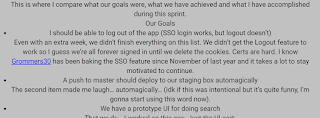Seneca Digital Health Hackathon
Seneca Digital Health Hackathon
When I was preparing for the interviews I read many articles on how to answer one or another question. Of course, most of the answers have to be tailored to a specific job posting. One question that I was asked during one of my interviews was to tell about my hobbies. I never came across this question neither I thought this question was something that I could be asked. After my interview, I have looked into the potential answers for the software developer position. To my greatest surprise, I find very interesting hobbies such as teach coding classes, contribute to the Open Source community, and of course Hackathon. The last one was the most interesting to me. I decided that why can't Hacathon be my hobby either. A few weeks later my school friend mentions that there will be Seneca Digital Health Hackathon. That was an opportunity to try out my new hobby.
Days before Hackathon. I and my groupmates had to pick a challenge set that we will work on. Our group decision narrowed to Cannabis Product Lifecycle. The idea was to develop an application that will track the Cannabis plant lifecycle from seed or clone until the time it is ready for sale. There were many different ideas to approach to solve this problem but our group try to keep the app simple to use for the end-user and at the same time give enough useful information for the company to predict future revenue or avoid potential loss.
First day of Hackathon. Hard work on gathering all the necessary information. Our group was thinking about using some external APIs in order to have enough information to make decisions like what conditions required to cultivate the plant, how many days need for certain seeds before they can be harvested etc. This step was more difficult than our group expected as there was not enough available information.
The second day of the Hackathon. A lot of coding needs to be done. That is not including the part of the database. As we tried to keep our application simple and use external APIs we didn't need a big database. Our application should be able to store enough information about the plant to make future decisions.
Snapshot of our database:
In order to implement the application, we used Spring Boot as our backend. Functionalities that were implemented on the backend are
1. Get All Categories
2. Get Category by Id
In our case categories consider the stage in which seed or clone currently is (for example planting, harvest, etc). Probably in this case also good to have an option to create a category for future use.
3. Get All Purposes
4. Get Purpose By Id
Purpose in our database served as a table that will store the end purpose of the Cannabis plant for example hash, oils, etc).
5. Create seed
6. Update seed
7. Get seed by Id
8. Get all seeds
The seed table holds all the information that users need to store in order to perform business analysis.
There are many more things that can be added to this basic functionality but this was the very first time to participate in the Hackathon. It was not easy and many challenges came into my way. At some point in the time, I was thinking that it is not a hobby that I can enjoy and I should just stop but I did not. I took a lot from this Hackathon and look forward to the next one. I also learned that it is not necessary to succeed from the first try but it is important to take a good lesson from the mistakes that were made. I also want to say thank you to my group leader Jennifer Bellafiore your knowledge and experience came in very handy.




Comments
Post a Comment